Battle over 'wokeness' at Christian colleges isn't just about politics, it's about dollars
For decades, Hillsdale College and Grove City College mirrored each other.
Fiercely independent, neither takes any federal dollars, including government-backed student loans, in order to be exempt from most federal rules.
Located in bucolic settings — Hillsdale in agricultural southern mid-Michigan and Grove City in the hills of western Pennsylvania — one feels smarter simply by stepping on the carefully groomed campuses with spectacular academic buildings, chapels and residence halls. Both have reputations as bastions of conservatism.
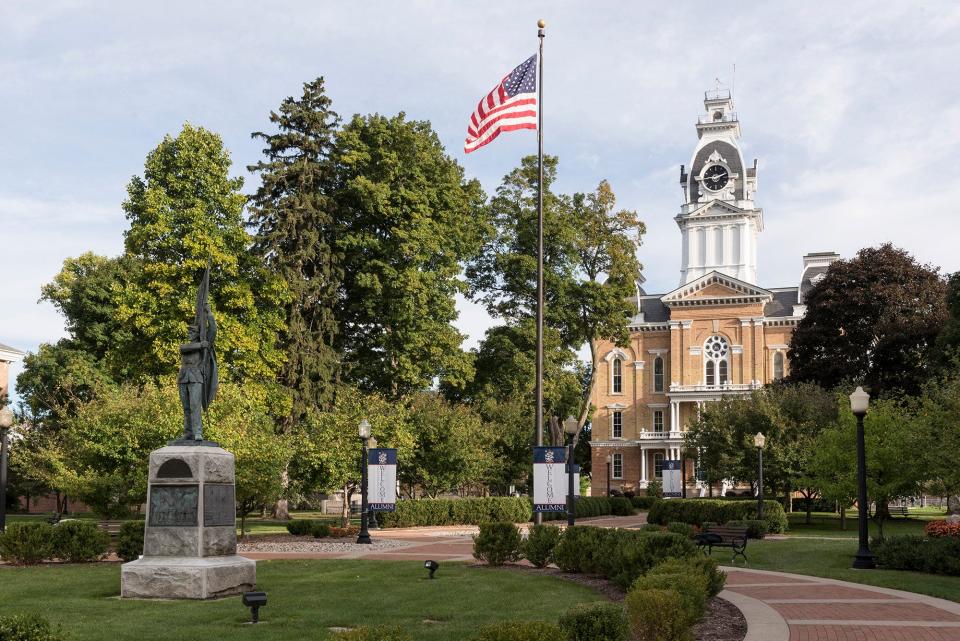
But the last two years have started to push the two apart, at least in the minds of their core markets.
Hillsdale, to the delight of conservatives and the consternation of liberals, has continued to burnish its conservative credentials. It has worked closely on education matters with Florida Gov. Ron DeSantis and Tennessee Gov. Bill Lee.
"The college's belief in genuine classical education and its deep admiration for the principles of the American Founding, as espoused in the Declaration of Independence and the U.S. Constitution, has made it a target for those who oppose such challenges to the status quo of what is now taught in most American institutions of higher education," Hillsdale spokeswoman Emily Davis told the Free Press, adding that Hillsdale wants all students, not just those in Michigan, to have a quality education. "Hillsdale College has been dedicated to pursuing truth and defending liberty since 1844 and has no plans of retreating from that noble effort."
And while Hillsdale alumni, students and faculty have been supportive of the college, alumni, students and faculty at Grove City have been engaged in all-out-war over whether it is woke.
The two schools represent the newest battle in Christian higher education, one that isn't centered on theological issues such as creationism or who is God, but rather on whether Donald Trump won the last election or whether Black people are still targeted by systematic racism in America. It's about politics brought to campus, witnessed by students who arrive as self-styled culture warriors, armed with smartphones and social media.
This conflict of ideas is setting up a litmus test with real consequences: Want to survive and perhaps even flourish as a small religious liberal arts school? Don't invite someone to speak on campus who can be characterized as being woke. Have your soaring chapel be dedicated with a speech from Clarence Thomas. Be a training ground for the next Ben Shapiro.
"The clearer a faith-based institution is on where they stand on issues, the more families are happy with them," said Jim Hunter, chief executive officer of Emerge Education, a Pennsylvania-based college enrollment consulting firm. He has studied and co-authored an academic paper on the topic.
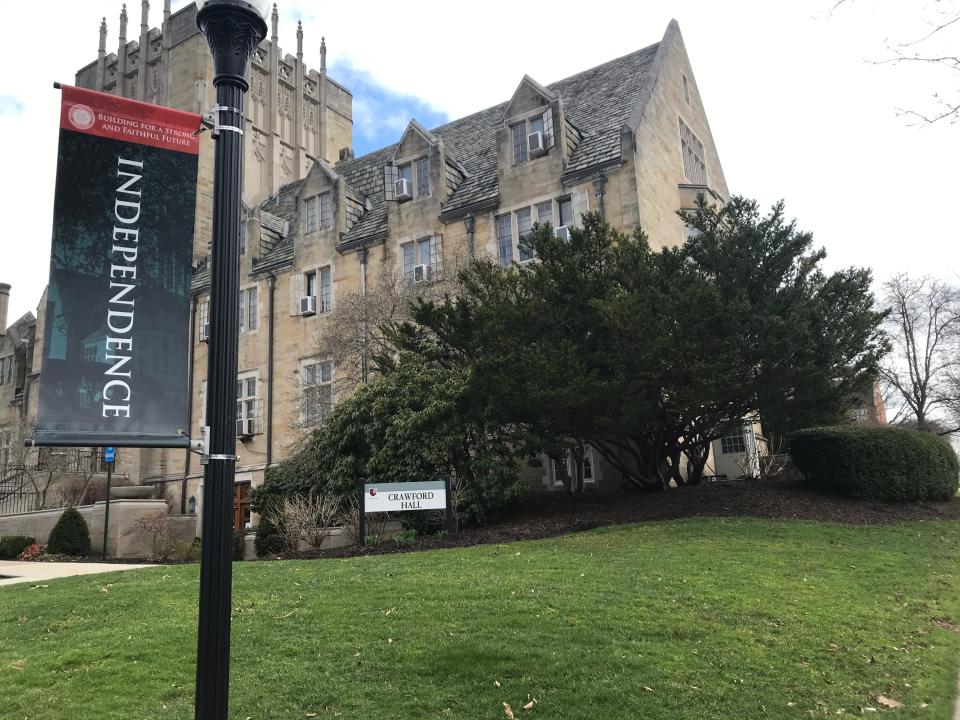
The statistics show a clear result: Moving off — or being perceived as moving off — from sufficiently conservative viewpoints is a major gamble with poor odds of success. The inverse is also true — the more conservative a religious-based college is, the better its odds are of not just surviving, but flourishing.
More: Why some small conservative Christian colleges see growth where other schools see declines
The growth comes in the crossing of two narratives. One: conservatives convinced in the depths of their hearts they aren’t welcome in higher ed and thus highly attuned to any slight — real or perceived — that their so-called safe institution is no longer a place where their views can be heard and even flourish. Two: a realization by college leaders that times are tough and they have got to keep people happy.
"It’s a major reality," said Grove City President Paul McNulty, a former George W. Bush appointee in the U.S. Attorney General's Office. "It’s a continuous reality. You have to always be thinking, 'how will this impact our ability to attract students?' "
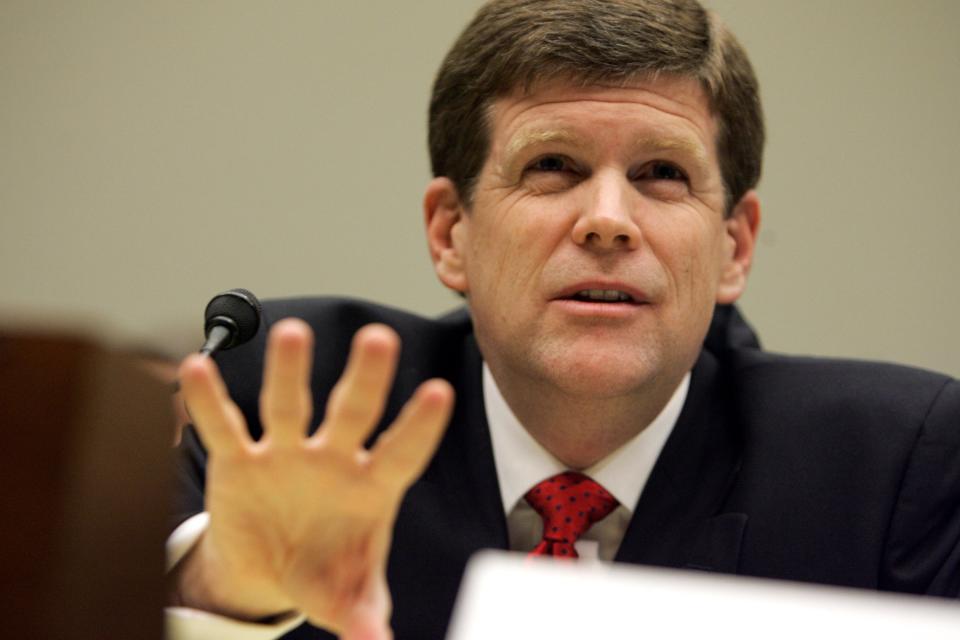
The upheaval in religious education is rivaling the great debates over higher education from the 1920s that led to the foundation of many superconservative schools, like what is now Bob Jones University, where some were upset over what they saw as a progressive-led move away from traditional belief systems to a more inclusive, modern approach to the world.
Different than previous Christian higher education disputes?
In 1994, I got word the president of the small Christian liberal arts college I was attending wanted to see me. The school, then known as Grand Rapids Baptist College, was going to announce it would be changing its name to Cornerstone College. As the editor of the school paper, I was going to be writing the story on the change and needed the information.
The name change was an acknowledgment by the school's board and administration that the student body was, while still Christian, not simply from the Baptist denomination. It was also part of other shifts, including the loosening of various rules, that left the college, while still more conservative than most places, a wee bit more progressive than before. The changes drew protests from some alumni and donors, worried about the direction of the school, particularly that it was moving away from its traditional set of beliefs.
It's not uncommon for there to be disputes about the direction in which a college is headed. Those debates date to the early 1900s, when a push was made to have colleges and universities focus more on scientific methods and less on their faith-based foundations. Then, in the 1920s, conservatives fought back and founded a variety of very conservative schools.
Now it's 2022. The most recent battle is on and experts believe this iteration is different than previous ones.
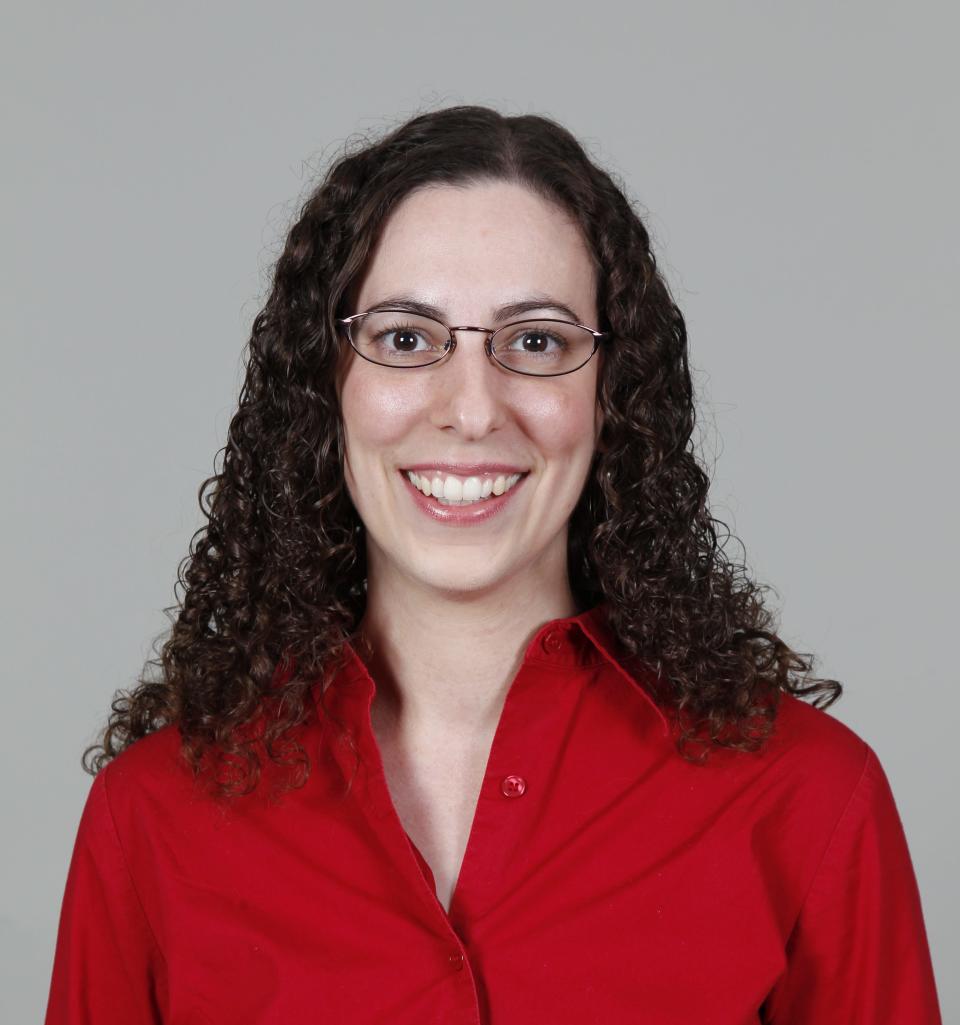
"This is not a split over classic theological beliefs," said Andrea Turpin, an associate professor of history at Baylor University and the author of a book on gender, religion and the changing of the American university in the early 1900s. "Nothing about the creeds is at stake at Grove City. They aren't debating questions like: Who is Jesus?"
The debates are about political issues, often wrapped in Bible verses and interpretations. In many cases, colleges aren't changing their political views, just becoming more vocal about them.
The schools are mirroring their donors. Those leaders who stay are the ones who can show growth and showing growth means listening to the donors and families who keep revenue coming in.
And at higher-priced colleges, which often opt out of federal grants and loans for students and the oversight that comes with them, parents have clear expectations.
"If they are willing to pay a premium, they want to get what they are paying for," Hunter said. "The lack of distinct values in the marketplace is a challenge in enrollment."
Shifting to a more conservative outlook can bring problems, too. Just ask my alma mater, the now-named Cornerstone University. In October 2021, Gerson Moreno-Riaño was set to be formally inaugurated as the school's president. But one day before the ceremony, faculty issued a vote of no confidence in him, saying he had allegedly opposed diversity, equity and inclusion efforts and created a culture of fear by firing staff and professors with little or no warning.
Moreno-Riaño came to Cornerstone from Regent University, founded by conservative evangelical leader Pat Robertson. One year before the no-confidence vote, Moreno-Riaño wrote about the "woke" movement in higher education, calling out schools where classrooms "are the breeding grounds of intolerance where the other, any other, who does not pledge absolute, blind allegiance to the emerging revolutionary ethos is demonized, canceled or destroyed."
This spring, Moreno-Riaño told me he felt like the school had moved past those conversations. He said he's trying to grow Cornerstone and doing so by showcasing how Christian higher education should work.
"The question is what does Christian mean today?" he said. "Is it subject to whatever the present culture is? Christian is meant to be the Gospel of Christ. At every institution (Christian or not) there's moral formation going on. Every (college) has an anchor point. We are a Christian school. That means we are to touch a deeper part of a person."
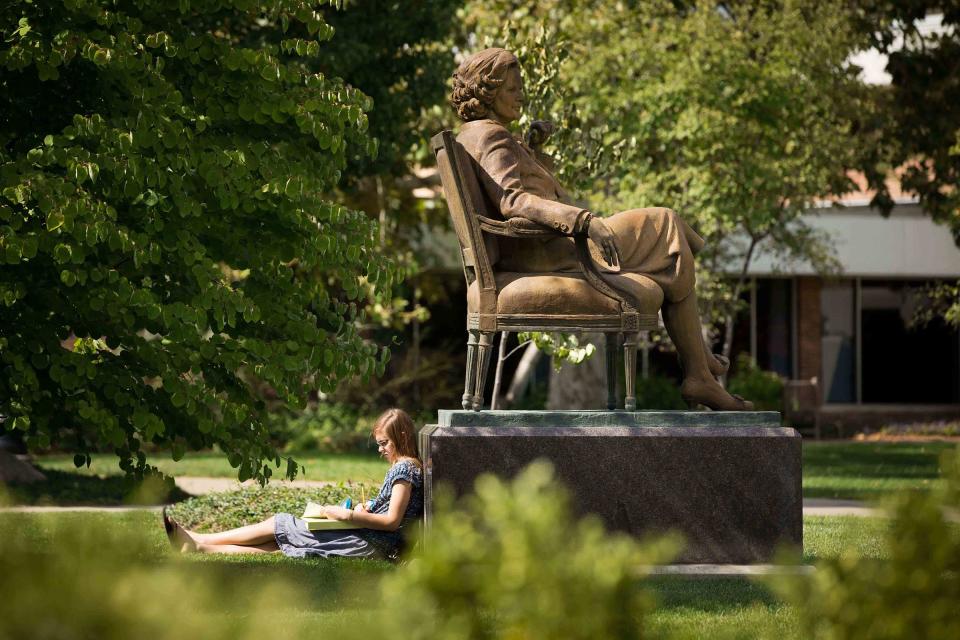
The number of applicants to Cornerstone has been slightly ticking up in the last couple of years. While not the perfect measure of a school's popularity (a student can apply to several schools), it does show interest level in the school. Through the start of June, applications for the 2023 school year were at 2,088 and school officials expected that to top the 2,117 received by summer's end the year before. Both those numbers are up from the 2,061 applicants for the 2020-21 school year.
"What makes a small college successful isn’t being conservative per se; it’s being distinctive," Turpin said. "If the dominant universities and liberal arts colleges in the U.S. shifted over time to become conservative, I would predict it would be the more liberal small colleges that would thrive more, because they’d be offering more of an alternative that would give parents a reason to send their children there instead of somewhere else.
"So the challenge for small Christian colleges that don’t want to contribute to the country’s hyper-political polarization is a vision and marketing one: They have to articulate, implement and publicize what it is that they offer that is genuinely distinctive from what is on offer at a secular college but is not just being more politically conservative."
Does a woke label drive away potential students?
Kelly McLaughlin's oldest daughter originally enrolled at Duquesne University, a Catholic school in Pittsburgh. But that didn't last long.
Upset about what they saw as a drift away from core beliefs, the McLaughlins decided she should transfer, and she ended up at Grove City. A second daughter would enroll a few years later and is still enrolled at Grove City.
McLaughlin had a clear goal for her daughters' college education: continue the training the devout Catholic family had pursued their daughters' entire lives.
"We didn’t want to undermine everything we’ve done their entire lives," she said. "What’s the point if at the end you were going to throw up your hands" and send them somewhere that doesn't reinforce the lessons previously taught?"
They believed they found it at Grove City, which isn't a Catholic school. "They (Grove City) were actually conservative and more welcoming to the Catholic faith than the Catholic colleges," she said.
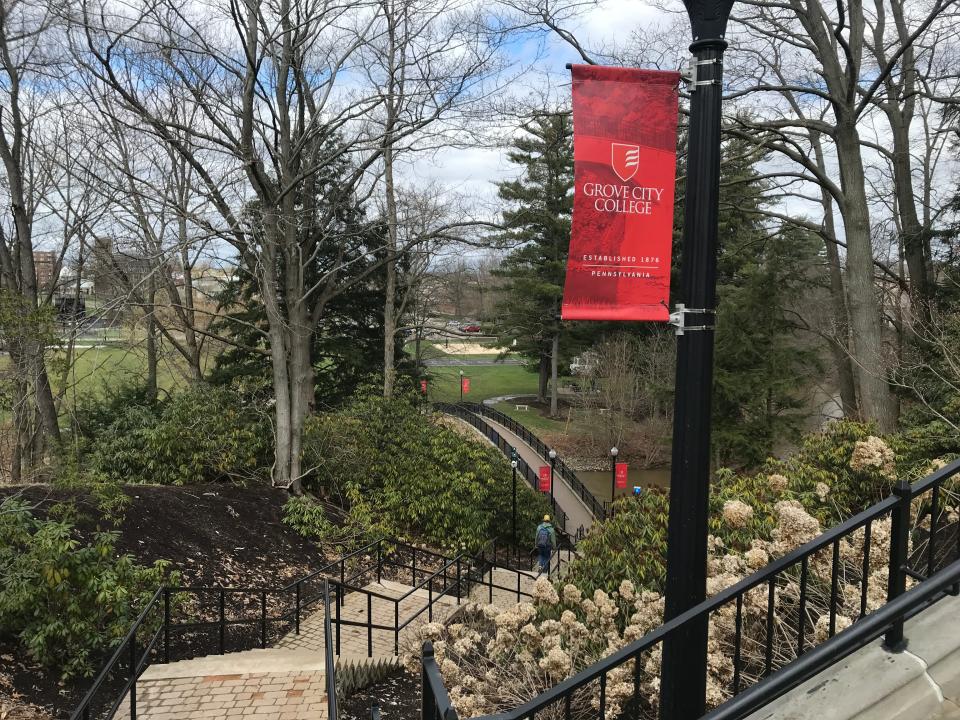
Then reports started coming out about an October 2020 chapel service at Grove City led by Jemar Tisby, who had written a best-selling book, "The Color of Compromise: The Truth about the American Church’s Complicity in Racism," in 2019.
McNulty said he read the book before the chapel service, and while not agreeing with everything in it, was "very convicted of history of the church ... my heart was broken."
In the 21-minute chapel address, Tisby speaks from Esther 4:12-14, a Bible passage where Mordecai tells Queen Esther she must speak out against planned attacks on the Jewish people. He also heavily drew on Martin Luther King Jr.'s “I Have a Dream” speech and letter from the Birmingham Jail to call on those in attendance to engage in racial justice work.
"We are living in the modern civil rights movement," Tisby said. "Freedom, justice, democracy, especially for Black people and other people of color, are in imminent danger."
He then challenged Grove City students to take action.
"What will it take to convince you that now is the time? How many more deaths? How many more videos? How many more marches? How many more protests? And then the question is, what will you do in such a time as this?" he asked, going on to tell those in attendance to “fill your minds with an awareness of racial justice so that five, 10, 20 years from now, you don’t have to say, ‘I never knew.' ”
Conversations about the chapel service were mostly muted and all in private for more than a year, until they burst into public with a petition from parents called "Save GCC from CRT."
Citing Tisby's talk and another in the 2021-22 school year, among other items, the petition was explicit in what it thought was going on: "From what we’ve observed, a destructive and profoundly unbiblical worldview seems to be asserting itself at GCC, threatening the academic and spiritual foundations that make the school distinctly Christian.
"That worldview is Critical Race Theory. Critical Race Theory and woke theology are divisive enemies of Christian unity. They pit Christians against one another based on skin color."
Critical race theory is a broad concept and the subject of long-standing academic research. It generally holds that U.S. justice, economic, cultural and other systems inherently help white people and discriminate against people who are Black or otherwise frequently marginalized. Conservatives believe it is a way to camouflage attacks on white students, making them feel their belief systems and lives are racist.
McLaughlin was among the parents upset.
"Discussing it is fine, but promoting it is much different," she said. "That this was going on in chapel ... to me that was stunning."
McNulty said the college was simply helping its students encounter various beliefs.
"We are not in the business of deconstructing people’s worldviews," he told the Free Press in late March. "We’re not into the politics and flavor of the day that would reject traditional values."
The issue exploded on social media and in conservative media outlets and podcasts. Parents expressed strenuous concerns, so much so that Grove City's board launched an investigation into whether the school was going woke and moving away from its mission.
The report found, among other items, that the college should be more careful about whom it invites to speak in chapel. It said Tisby should have been a guest lecturer speaking in a class or in a lecture hall.
And the board committee tried to paint Grove City back into the conservative camp.
"To the petitioners and outside observers who may have wondered if Grove City College is going 'woke,' the answer is emphatically no," they wrote in the report. "By any standard, GCC remains one of the most conservative colleges in the country."
The private worry among college administrators was that being labeled as woke would dry up enrollment and donations, which is a bigger deal for schools like Grove City.
The school is one of a few colleges, including Hillsdale, that eschew federal grants and loans for its students, which exempts it from federal rules and reporting.
Since its founding, Grove City hasn't accepted direct federal funds, which would hamper its ability to be independent. But it did for a time allow students to use federal loans. In the mid-'70s, the federal government required the school to certify it was meeting Title IX, a federal law prohibiting sex discrimination in federally funded higher education. The college sued and said it shouldn't have to, since it was free of direct federal funds. That led to a landmark U.S. Supreme Court decision and prompted Grove City to pull its students out of the federal college loan pipeline.
The lack of any federal dollars means the school is highly reliant on tuition dollars and donations for revenue. Any significant dip could cause major issues.
In 2019-20, the college had 1,697 applications for enrollment. In 2020-21, applications dropped to 1,624. Then it rebounded slightly, climbing to 2,170 applications for the coming 2022-23 school year.
But that growth in applications pales in comparison to other conservative schools to which Grove City students also apply, a Free Press review shows.
The controversy at Grove City arrived just as the market seemed to be tilting in its direction, thanks to decades of belief — heightened in the Trump era — that higher education is largely biased against conservative students.
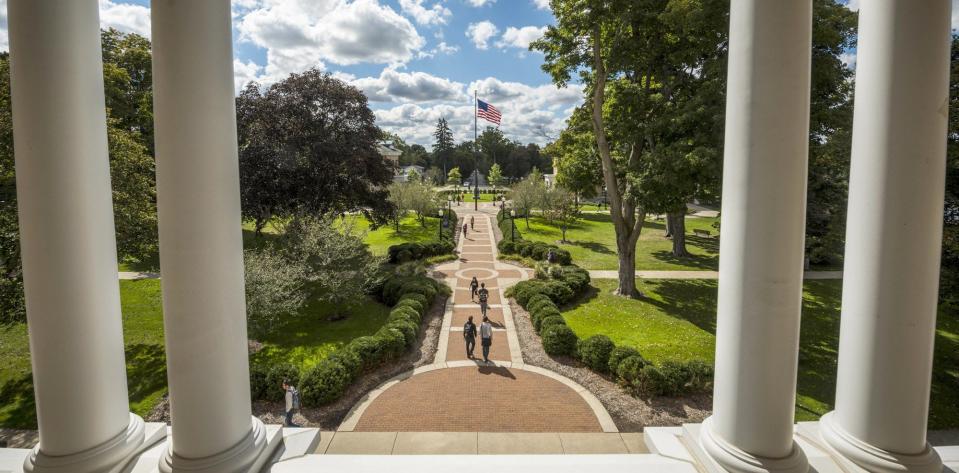
A previous Free Press review of 34 four-year colleges that are charter members of a new conservative association of Christian colleges — to which both Grove City and Hillsdale belong — shows total enrollment at those schools up nearly 8% when comparing fall 2020 enrollment with fall 2010 enrollment.
More: Michigan colleges feeling pinch, compete over shrinking pool of prospective students
A longer-running and bigger association of Christian colleges — with a generally broader canvas of Christian beliefs and practices — is also seeing growth, but less dramatically. Total enrollment is up about 3% over that same decade.
The growth at both camps of Christian colleges far outpaces the overall trend in the private nonprofit school sector. According to that Free Press review of federal data, total enrollment at 950 nonprofit four-year colleges across the country, specifically those with fewer than 5,000 students, fell by about 10% from 2010 to 2020.
"Parents have expectations" of what they want from Grove City, McNulty said. "They tell us, 'It’s you or Hillsdale.' (They say,) 'We want to go to places like that because we can be confident they won’t be teaching contrary traditional values.' "
Firmly conservative and skyrocketing growth
The most liberal of liberals and the most conservative of conservatives could agree on this: Hillsdale College is conservative with a capital C.
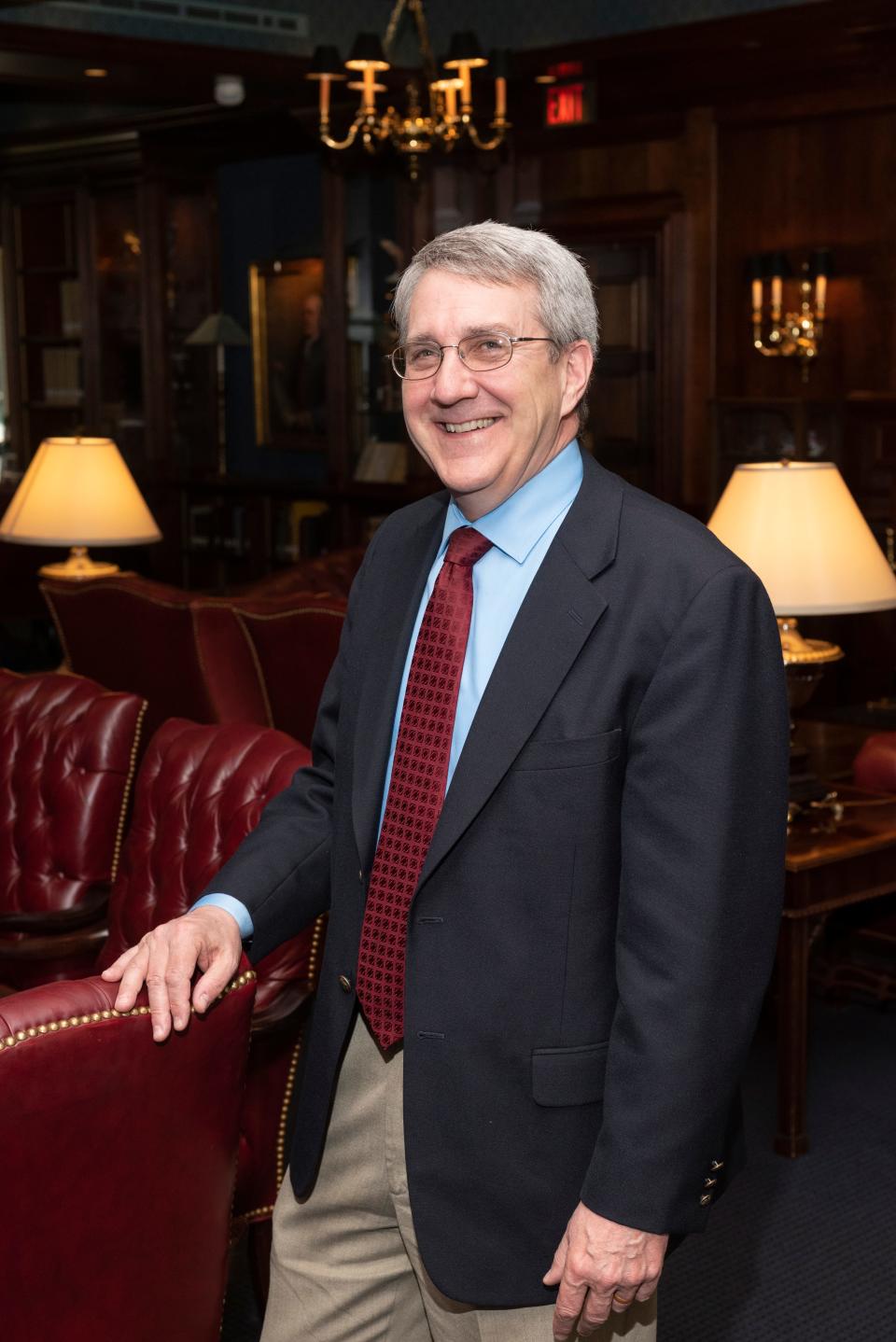
Take the reaction to news media reports of Hillsdale President Larry Arnn's comments attacking teachers, education, diversity administrators and others at a private event with Tennessee's Republican governor. Hillsdale is helping to set up a chain of charter schools in the state. Liberals attacked the comments, raising alarm about what they say is the rise of uber-conservative forces. Conservatives defended Arnn, saying he was simply speaking the truth. Hillsdale has also become heavily involved in Florida politics, partnering with GOP leaders there in a major push to change what is taught — and how.
Founded in 1844, Hillsdale has a long history of traditional conservative values. One of its earliest presidents was among the founders of the Republican Party in nearby Jackson. In the 1980s, after the Grove City College court case, Hillsdale completely withdrew from accepting any federal funds. After controversy and scandal in the late 1990s, the college has rebounded.
"In an age when most institutions change as rapidly as the highly volatile spirit of the moment, we remain true to our founding principles and mission. People recognize the difference," said David Whalen, the former provost and current associate vice president for curriculum and a professor of English. "Students and families want college, not pseudo-education."
The number of students applying for admission to Hillsdale has skyrocketed in recent years. In 2019, 2,328 students applied for admission. In 2022, more than 3,400 have applied for admission to the school. That's a nearly 50% increase.
Those students know exactly what they are going to get when they go to Hillsdale, and there's a growing market for it.
"Hillsdale keeps its values the same because they are embedded in the mission — a treasured mission that is not ours to alter or ignore," Whalen said. "Hillsdale College faculty, students, and staff are here in service of the mission, not to bend it on a whim nor according to the idol of the day.
"I know we have students who applied or transferred here because they are worried about other colleges and universities — they became disillusioned about institutions that simply go through the motions."
Hillsdale's growth isn't an isolated case among conservative schools.
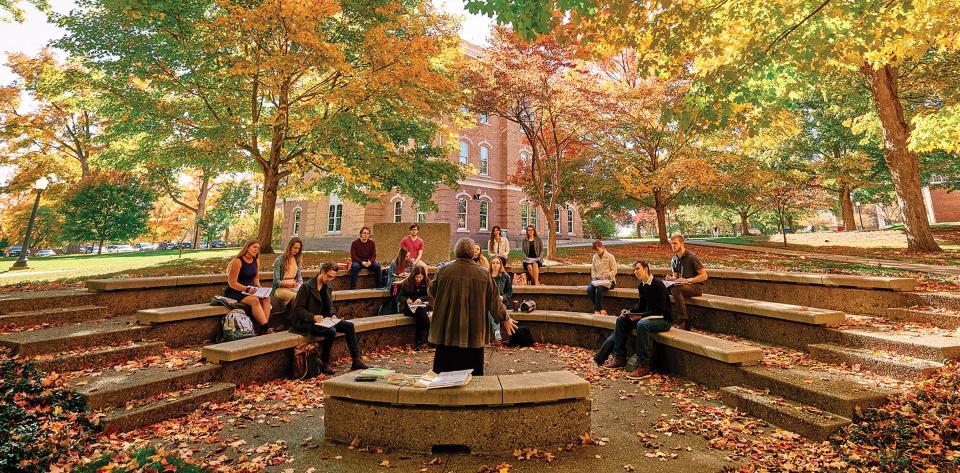
Consider Cedarville University, a Baptist-affiliated school near Dayton, Ohio. After a several years of enrollment decline, it started increasing enrollment in the 2010-11 school year. A new president arrived in 2014 and Cedarville embraced its traditional conservative beliefs, helping drive enrollment growth since that 2010-11 school year.
In 2019, the university got 3,869 applications from prospective students for its freshman class. As of June 22, the university had 5,403 applications for the 2022-23 school year. That's 40% growth.
Parents have always been interested in what their students will be exposed to at college, said Scott Van Loo, Cedarville's vice president for enrollment management. Van Loo, who served in various student life and admissions roles at Cedarville from 2000 to 2009 and returned in 2016, said the questions for college staff have changed.
"The questions are more intentional," he said. "What can I expect will happen in the classroom?' They want to make sure the Bible is taught. They aren't asking, 'Do you have a Christian worldview,' they are asking, 'Do you have a biblical worldview?' "
Cedarville's growth, Van Loo said, is attributable, in part, to being able to answer yes to those questions.
Culture warriors or college students?
In the fall of 2021, a Grove City College chapel service featured chaplain Donald Opitz, who used a talk by Bryan Stevenson, a nationally known lawyer and social justice activist, to talk about mercy.
After the chapel service, a freshman there reached out to someone in the group of parents who filed the petition calling for change at Grove City to say he was troubled by the chapel service and wanted to know how he could stop the spread of critical race theory on campus. About a month after that chapel service, the parents published their petition, which included several examples of what the group said was evidence of CRT spreading at the college, most of which was reported by students to their parents.
That kicked off the debate over whether Grove City was "woke" and teaching CRT. It also showcased the polarization that is no longer just between Democrats and Republicans, conservatives and liberals, but between conservative and conservative and liberal and liberal.
"I worry that our polarization is extended to the point where I don’t know how we come out if it," McNulty said. "It seems to be much different than in the past.
"Students come in seeing themselves as culture warriors. They see everything through that lens."
David Jesse was a 2020-21 Spencer Education Reporting Fellow at Columbia University and the 2018 Education Writer Association's best education reporter. Contact David Jesse: 313-222-8851 or djesse@freepress.com. Follow him on Twitter: @reporterdavidj. Subscribe to the Detroit Free Press.
This article originally appeared on Detroit Free Press: Being labeled as 'woke' can cost Christian colleges students, money

